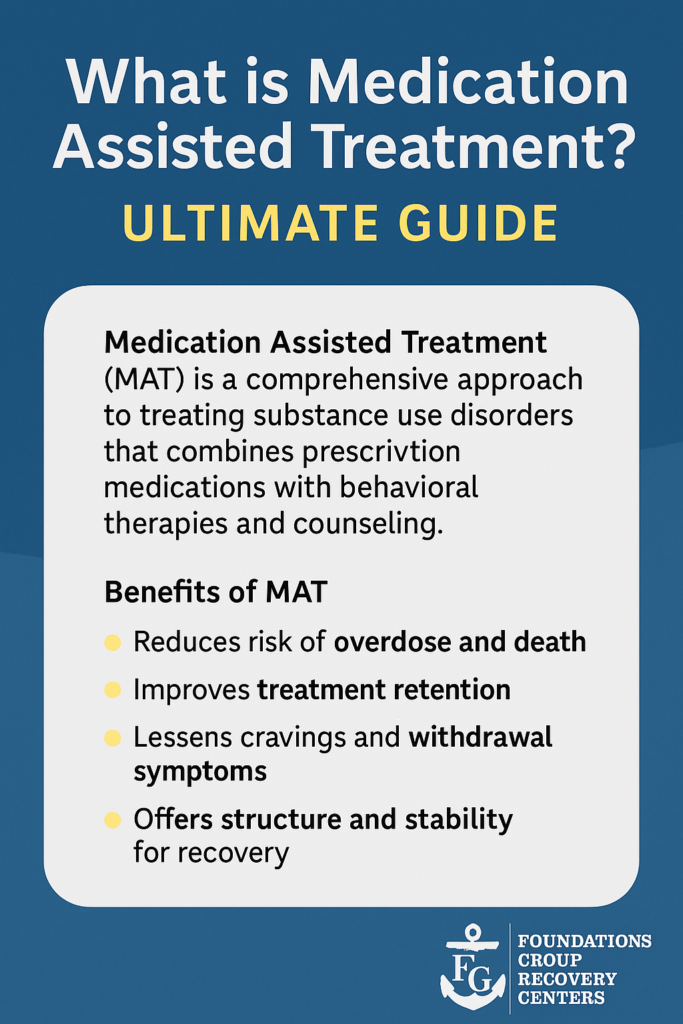If you’re researching Medication Assisted Treatment (MAT), you’re likely not here by accident. Maybe you’ve heard about it in passing. Maybe you’re weighing your options after trying to quit on your own. Wherever you’re at, this guide is here to offer clarity, not pressure.
At Foundations Group Recovery Center in Massachusetts, we provide MAT with care, safety, and real support. Here’s what you need to know to make an informed, confident decision.
What Is Medication Assisted Treatment (MAT)?
Medication Assisted Treatment (MAT) is a comprehensive approach to treating substance use disorders that combines prescription medications with behavioral therapies and counseling. This method is most commonly used for opioid and alcohol use disorders but is part of a broader strategy for supporting sustainable recovery.
The medications used in MAT are FDA-approved and are carefully selected based on each individual’s history, substance use pattern, medical needs, and personal recovery goals. Unlike outdated views that focus solely on abstinence, MAT acknowledges that recovery is a medical, emotional, and psychological process.
The ultimate goal of MAT is to support people in stabilizing their lives so they can begin to heal—physically, mentally, and emotionally. It helps ease the symptoms of withdrawal, reduce cravings, and minimize the risk of relapse.
Types of Medications Used in MAT
Every MAT plan is unique, and part of that is choosing the right medication. The most commonly used medications include:
- Buprenorphine (Suboxone): A partial opioid agonist that attaches to opioid receptors in the brain. It helps reduce cravings and withdrawal symptoms without producing the same high. Suboxone includes naloxone to help prevent misuse.
- Methadone: A long-acting full opioid agonist that can help stabilize people with severe opioid use disorder. It must be dispensed in specialized clinics due to its potency and potential for misuse.
- Naltrexone (Vivitrol): An opioid antagonist that blocks the euphoric and sedative effects of opioids and alcohol. Unlike methadone and Suboxone, it does not produce any opioid effects and is often administered as a monthly injection.
Each of these medications works differently and is suited for different needs and preferences. Our clinical team at Foundations Group Recovery Center works closely with you to determine the safest, most effective option.
How MAT Supports Long-Term Recovery
Medication alone is not a cure for addiction. What MAT offers is a foundation—a platform from which healing can begin. By reducing the physical and psychological burden of withdrawal and cravings, MAT creates space for deeper recovery work.
Some of the long-term benefits of MAT include:
- Reduced risk of overdose and death: MAT is scientifically proven to lower the risk of fatal overdose, particularly for people with opioid use disorder.
- Improved stability: When cravings are under control, people are better able to engage in therapy, rebuild relationships, and maintain employment or education.
- Better treatment retention: People on MAT tend to stay in treatment longer and report greater satisfaction with their progress.
- Lower relapse rates: Studies consistently show that people on MAT relapse less frequently than those using abstinence-only models.
Recovery isn’t linear. MAT doesn’t promise a smooth path, but it can provide the structure and stability needed to keep going.
Debunking Common Myths About MAT
Despite its proven effectiveness, MAT is still surrounded by misinformation. Let’s clear up a few of the most common myths:
Myth: You’re just replacing one drug with another.
Fact: MAT medications are medically supervised and do not produce a high when taken as prescribed. They support brain stabilization and improve overall functioning.
Myth: People on MAT aren’t really sober.
Fact: Recovery is not one-size-fits-all. For many, MAT is the safest and most effective way to regain control and rebuild their lives.
Myth: You can’t stop using MAT once you start.
Fact: MAT plans are flexible. Tapering is possible and should be done gradually and with clinical guidance. Some choose to stay on MAT long-term for continued support, and that’s okay too.
How to Start Medication Assisted Treatment in Massachusetts
Getting started with MAT might feel overwhelming—especially if you’ve had a bad experience with treatment in the past or if you’re unsure whether it’s the right fit. At Foundations Group Recovery Center, our process is designed to be clear, respectful, and collaborative.
Here’s what to expect:
- Initial Consultation: We start with a comprehensive assessment to understand your substance use history, physical health, and personal goals.
- Medical Evaluation: Our clinical team evaluates your medical needs to determine which MAT option is safest and most effective.
- Personalized Treatment Plan: We build a care plan that includes medication, therapy, and support tailored to your needs.
- Ongoing Monitoring: You’ll receive continuous medical oversight and regular check-ins to adjust your treatment as needed.
- Whole-Person Support: In addition to medication, you’ll have access to counseling, peer support, and case management.
We offer MAT in both outpatient and structured treatment settings, depending on your needs and readiness.
FAQ: Medication Assisted Treatment
Is MAT safe?
Yes. When administered under medical supervision, MAT is a safe and effective treatment method for substance use disorders. All medications used in MAT are FDA-approved.
Will I have to stay on medication forever?
Not necessarily. Some people benefit from long-term use, while others taper off gradually. It’s a personal decision made with your care team based on your progress and comfort.
Can I still go to therapy or support groups while on MAT?
Absolutely. In fact, combining medication with therapy is a core part of MAT. We encourage participation in support groups and behavioral counseling as part of your recovery.
Is MAT only for opioids?
No. While MAT is most commonly associated with opioid use disorder, it is also used effectively for alcohol use disorder using medications like naltrexone and acamprosate.
How do I know if MAT is right for me?
A good first step is a no-pressure consultation. Our team will walk you through your options, answer your questions, and help you determine what fits your needs best.
Ready to Talk Through Your Options?
You don’t have to know for sure. You just have to be willing to ask. If Medication Assisted Treatment might be right for you, or if you’re not sure what to do next, we’re here.
📞 Call us at (844) 763-4966 to talk with a team member who understands and respects where you’re coming from. Or learn more about our Medication Assisted Treatment program in Massachusetts. We’re ready when you are.


